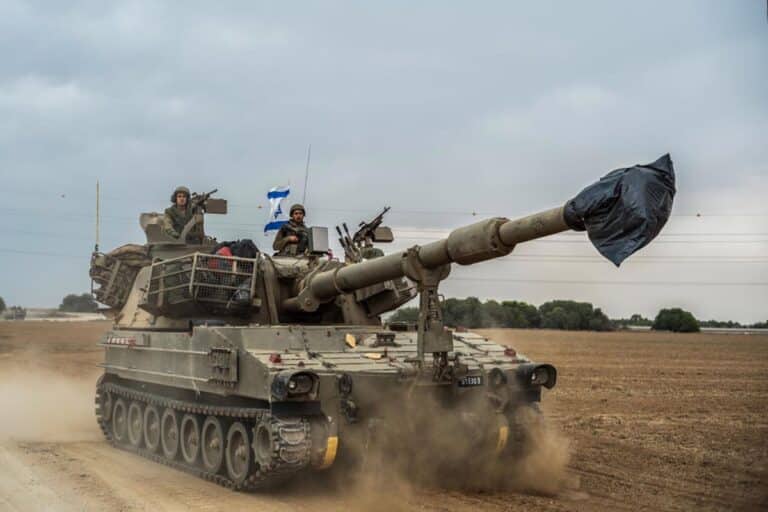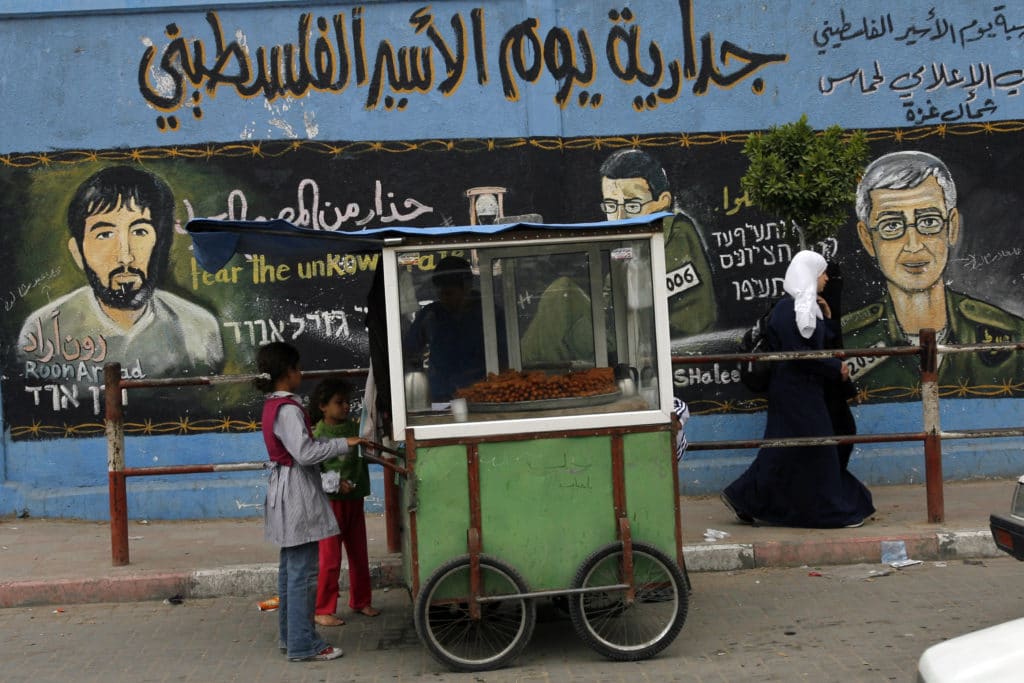
At 6:30 AM on Saturday — coinciding with Shabbat and the Simchat Torah holiday — Hamas launched an unprecedented surprise attack against Israel. The attack took place one day after the 50th anniversary of the Yom Kippur War, mirroring the shock and horror of that conflict in which Israel was also caught off guard.
As of Monday afternoon in Israel, estimates are that at least 800 Israelis have been killed, over 2,200 have been wounded, and more than 100 soldiers and civilians are being held hostage in Gaza.
How to support Israeli soldiers and civilians amid the Hamas attacks
Hamas terrorists waged a multifront attack, invading Israel by land, sea, and air. First, they bombed Israeli observation towers on the Gaza border, then fired thousands of rockets and used explosives to break through the border fence. This allowed hundreds of terrorists to infiltrate Israel with trucks, boats, and paragliders. Within hours, thousands of rockets were fired at Israel with several landing and causing civilian casualties.
A compilation of Hamas clips shows how the terror group invaded southern Israel yesterday. First they bombed Israeli observation towers and weapons systems on the border, then fired hundreds of rockets as terrorists on paragliders flew over the border. Moments later, Hamas… pic.twitter.com/D4iIoCV51q
— Emanuel (Mannie) Fabian (@manniefabian) October 8, 2023
Hamas terrorists infiltrated several villages in southern Israel, launching door-to-door raids on Israeli homes, massacring families and taking hostages. “We are at war,” Prime Minister Benjamin Netanyahu declared in a filmed statement, several hours into the fighting.
On Sunday afternoon, Israel carried out intense airstrikes on targets in Gaza. On Monday, Defense Minister Yoav Gallant announced a “complete siege” of Gaza. “There will be no electricity, no food, no fuel, everything is closed,” he said. Israel has called up 300,000 reservists within 48 hours, the largest mobilization in Israeli history.
Between Saturday and Monday morning, over 1,200 targets were hit by Israeli aircraft across the Gaza Strip, including weapons storage and manufacturing sites, command and control centers, rocket launchers and more.
— Israel Defense Forces (@IDF) October 9, 2023
Today we doubled that number. pic.twitter.com/bRxZetbNqP
In one devastating attack at an outdoor festival near Kibbutz Re’im, Hamas gunned down hundreds of young Israelis and took hostages; at least 260 bodies were found at the site. The IDF has engaged in gun battles with Hamas in at least 22 locations inside Israel, and continues to fight Hamas terrorists within Israeli territory.
Meanwhile, on Palestinian social media, footage showed captured Israeli soldiers and civilians — including elderly women, mothers, children and babies — being dragged into Gaza and paraded through the streets.
In interviews on Israeli TV and radio, Israelis searching for missing family members pleaded for information. Some learned their loved ones had been taken captive through photos and videos posted on social media.
“For the first time in [Israelis’] lives, it feels as if there is no functioning country. People don’t know where their family members are, but what little information they’re getting, they’re getting from Hamas,” author Daniel Gordis wrote.
One Israeli, Yoni Asher, tracked his wife’s phone location to Gaza and watched in horror as a video shared on social media showed his wife, mother-in-law, and two daughters, aged 3 and 5, held captive by Hamas.
The deadliest attack in Israel’s history
This attack is the deadliest in Israel’s history, and the deadliest 24 hours in Jewish history since the Holocaust — and casualties continue to rise.
“Never before have so many Israeli civilians and soldiers been killed in one day,” IDF spokesperson Lieutenant Colonel Jonathan Conricus said.
Most of the casualties are civilians, including infants and the elderly. Israeli and global commentators are calling this Israel’s 9/11 moment.
Watching the horrors of this attack, Israel and the world have questioned how Israel and its intelligence partners could have not known what Hamas was planning.
The former head of the Israeli Navy Eli Maron called it a “colossal failure,” while former IDF intelligence chief Amos Yadlin said it was an “intelligence failure” akin to the 1973 Yom Kippur War. Following Israel’s victory in the 1967 Six-Day War, Israel adopted a mindset of overconfidence that became known as the “conceptzia,” enabling the surprise attack on Yom Kippur in 1973.
Although the Hamas attack and the Yom Kippur War share the element of surprise, the two also have notable differences. Even during the Yom Kippur War, considered to be Israel’s most devastating, zero civilians were killed.
Additionally, as U.S. Secretary of State Antony Blinken pointed out on NBC’s Meet the Press, while the Yom Kippur War was “a state-on-state conflict, army against army with clear front lines, this is a massive terrorist attack targeting Israeli civilians.”
What is Hamas?
Hamas, established in the late 1980s, is a fundamentalist Islamic resistance movement that aims to destroy Israel in order to replace it with an Islamic Palestinian state.
Recognized as a terrorist organization by the U.S., Canada, and the European Union, its early activities focused on social services, but it later engaged in acts of terror against Israel.
The terror group was behind a wave of devastating suicide bombings and other activities in the 1990s and 2000s. In recent decades, Hamas has launched thousands of rockets at Israel, dug attack tunnels in order to infiltrate Israeli communities, and inspired countless lone-wolf attacks on Israeli soldiers and civilians.
The group rose to power in Gaza following Israel’s 2005 disengagement, when Israel evacuated all its citizens and military presence from the area. Today, Hamas governs over 2 million Palestinians with a fundamentalist religious doctrine.
Tensions between Hamas and Israel have escalated into several major confrontations, including the 2008-2009 Gaza War, Operation Cast Lead, and the 2014 war known as Operation Protective Edge.
The abduction of dozens of Israeli citizens in this week’s assault marks the first kidnappings of Israelis into Gaza in 17 years.
In 2006, Israeli soldier Gilad Shalit was kidnapped by Hamas terrorists and held in Gaza for five years. Shalit finally returned home in 2011 as part of a controversial prisoner exchange deal. In exchange for Shalit, Israel released 1,027 Palestinians held in Israeli jails, some of whom were serving life sentences for conducting terrorist attacks that killed Israelis.

The rescue of captives always presents a complex moral dilemma. What will a resolution look like this time, with potentially dozens of Israeli soldiers and civilians held in Gaza?
The broader context
This assault against Israel comes amid months of inner turmoil over the judicial overhaul and talks of a possible normalization deal with Saudi Arabia.
The judicial reform debate has sparked months of internal unrest, increasing political polarization and jeopardizing the stability of the current government coalition.
Israel is also currently on the verge of establishing diplomatic ties with Saudi Arabia as it negotiates a normalization deal between the two countries and the United States. Some have speculated that this attack is a last-ditch attempt by the Palestinians and Iran — which has long funded and supported Hamas — to prevent such a deal from materializing.
Reactions from the international community
In response to the attack, Israel has initially received an outpouring of support from the international community.
American and European leaders condemned the Hamas attack, supported Israel, and affirmed Israel’s right to defend itself.
U.S. President Joe Biden called the Hamas attack “appalling” and “unconscionable,” saying in a live address that “the United States stands with the people of Israel…in the face of these terrorist assaults. Israel has the right to defend itself and its people.”
The world is seeing appalling images.
— President Biden (@POTUS) October 7, 2023
Thousands of rockets raining down on Israeli cities. Hamas terrorists killing not only Israeli soldiers, but civilians on the streets and in their homes.
It’s unconscionable. Israel has a right to defend itself – full stop.
Canada strongly condemns the current terrorist attacks against Israel. These acts of violence are completely unacceptable. We stand with Israel and fully support its right to defend itself. Our thoughts are with everyone affected by this. Civilian life must be protected.
— Justin Trudeau (@JustinTrudeau) October 7, 2023
The UK unequivocally condemns the horrific attacks by Hamas on Israeli civilians.
— James Cleverly🇬🇧 (@JamesCleverly) October 7, 2023
The UK will always support Israel’s right to defend itself.
Around the world, iconic landmarks from the Empire State Building in New York City to the Brandenburg Gate in Berlin — which once stood as a symbol of Nazi Germany — lit up in blue and white. In another expression of solidarity with Israel and the victims, lights of the Eiffel Tower were shut off on Saturday night.
La tour Eiffel vient de s'éteindre en hommage à toutes les victimes de l’attaque terroriste perpétrée par le Hamas.
— Anne Hidalgo (@Anne_Hidalgo) October 8, 2023
Demain soir, en solidarité avec les Israéliens elle sera éclairée aux couleurs de leur drapeau. 🇮🇱 pic.twitter.com/jz9uQrZgYo
Meanwhile, Jordan, Egypt, and the UAE — all countries with peace agreements with Israel — called for deescalation and restraint, but did not explicitly condemn Hamas. Saudi Arabia, in the midst of normalization talks with Israel, also did not condemn Hamas but merely called for a stop to the violence.
Unity in Israel
In a sign of unity, opposition leaders Yair Lapid and Benny Gantz met with the prime minister to set aside their significant differences and form an emergency unity government.

An emergency wartime government would bring together the most experienced politicians to manage the complex operations of the war. Symbolically, it would also show Israelis and the international community that Israel stands strongly as one.
“At times like these, there is no opposition or coalition in Israel. We will give full backing to the security forces for a harsh response against terrorism and its proxies,” Lapid said.
Similarly, the Brothers and Sisters in Arms group that has organized protests against the government since January urged all who are called up for military service to report for duty “without hesitation.”
Thousands of Israelis rushed to donate blood, leading to such a high turnout that Magen David Adom had to send people home due to the long lines and overload.
In his address to the nation, Israeli President Isaac Herzog thanked the “citizens and fighters, from across Israeli society, who all showed up, put all their differences aside, and in unimaginable acts of heroism with true ferocity, stood up boundlessly and ceaselessly went out to defend our home.”
This is a developing story.
Originally Published Oct 9, 2023 11:46AM EDT
